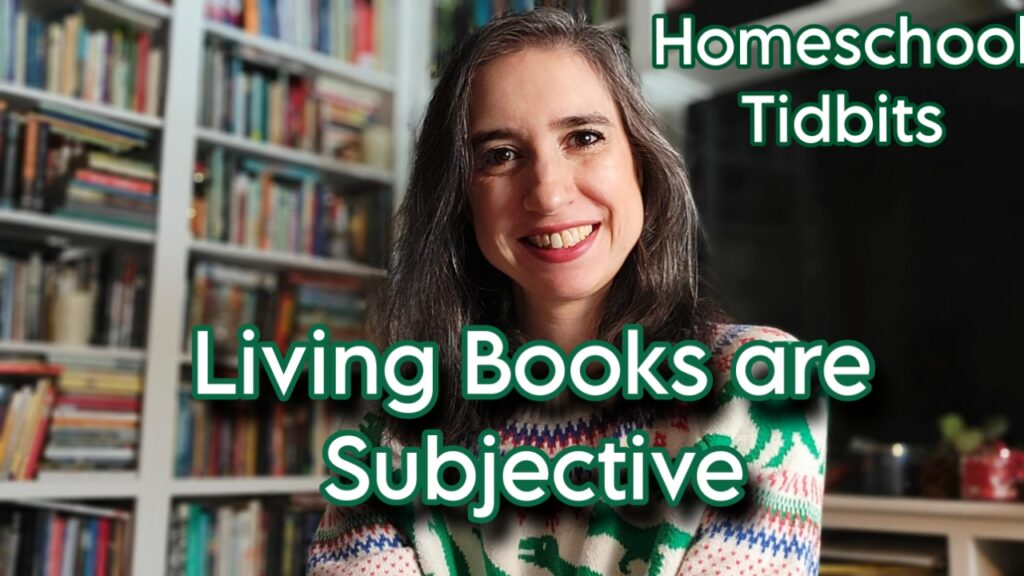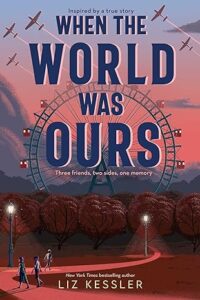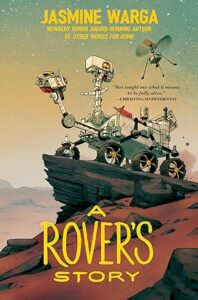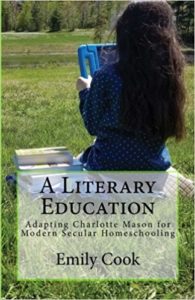Homeschool Tidbits: On the Subjectivity of Living Books
February 2, 2024
 Welcome to Build Your Library’s Homeschool Tidbits: Episode 66 – On the Subjectivity of Living Books. In this weekly video series, I will delve briefly into a topic related to homeschooling and will share some of my knowledge and expertise as a long-time homeschooling mother of 4 children. Three of whom have graduated high school, and one who is a college graduate!
Welcome to Build Your Library’s Homeschool Tidbits: Episode 66 – On the Subjectivity of Living Books. In this weekly video series, I will delve briefly into a topic related to homeschooling and will share some of my knowledge and expertise as a long-time homeschooling mother of 4 children. Three of whom have graduated high school, and one who is a college graduate!
We’ve talked about living books several times now, and we know that we should provide our children with a feast of ideas, many of those coming from a rich selection of living books. But the other day, I was thinking about the differences between “twaddle” and “living books”, and it occurred to me that just as one man’s trash is another man’s treasure, so it goes with literature. Now, that’s not to say that I think all twaddle could be a living book.
There is quite a lot out there that is nothing more than mind candy. There’s nothing wrong with that, and I don’t enforce limits on what my children can and cannot read precisely because I think a little mind candy is fine occasionally. But I do believe that what some might consider twaddle, someone else might call a living book.
Who decides what a living book is, anyway?
Let me explain. Just because someone claims a book is “living” doesn’t mean that you will automatically love it or that your children will benefit from reading it. That doesn’t imply that the book is inherently bad, but rather that it isn’t for you. Your mileage will vary depending on your taste and that of your child. Just poking around on the internet, I found Charlotte Mason-style lists where the books are all old and out of print, exclude modern books (because apparently, all modern literature is twaddle if Charlotte Mason herself didn’t recommend it?), and greatly lacking in cultural diversity.
I’m not here to perpetuate an old-fashioned education for my children or anyone else. We live in a modern and culturally diverse world, and our reading should reflect that. Nor do I believe that just because a book is old, it is living. I think if Charlotte Mason were alive today, her booklists would be full of modern, diverse literature.
The definition of a living book doesn’t say that every book labeled as living will automatically be the best for your child. It just states that to be considered living, it should be filled with inspiring ideas, be well-written, and thought-provoking. Millions of books will fall within the window of living books. But which ones will be the best for your child?
Finding the Right Living Books for Your Children
This will take trial and error. You need to consider many things, but the most important is figuring out what your child will enjoy reading. My youngest is very picky about books, so I’ll do a bit of a case study to give you an example.
She isn’t a big fan of historical fiction and prefers more modern history to anything set in the distant past. Here are some of her favorite historical books:
- Jefferson’s Sons
 by Kimberly Brubaker Bradley
by Kimberly Brubaker Bradley - The War that Saved My Life and The War I Finally Won by Kimberly Brubaker Bradley
- When the World Was Ours by Liz Kessler
But if you throw some magical element into the story? She’ll almost always eat that up.
- The Prairie Thief by Melissa Wiley
- Sweep: The Story of a Girl and Her Monster by Jonathan Auxier
 But not just in historical fiction – if there is a cute magical creature, talking robot, or anything that could be considered a cute friend – she’s all in.
But not just in historical fiction – if there is a cute magical creature, talking robot, or anything that could be considered a cute friend – she’s all in.
- The Wild Robot series by Peter Brown
- A Rover’s Story by Jasmine Warga
- Watership Down by Richard Adams
I can also learn from what she didn’t like. Much to my chagrin, she hated Anne of Green Gables when we read it last year. She also despised A Wrinkle in Time and The Giver. All three books are considered timeless classics that I loved and was very excited to read with her.
But that doesn’t mean she doesn’t like science fiction or dystopian literature! Because she loved The Hitchhiker’s Guide to the Galaxy and The Hunger Games. Looking at what she likes and dislikes, I can see that she isn’t a fan of overdramatic characters (Anne and Meg) or dystopian stories that are heavy-handed or leave too much to the imagination.
And that isn’t to say she doesn’t like any classics – she loved our Edgar Allan Poe unit last year, and she’s completely captivated by Lord of the Rings.
Based on that trial and error, I can curate her reading specifically to her taste.
Now, I didn’t go through all of that to tell you that the books my daughter loved are books that your children will also love. They might! But also, they might not. And that’s ok! Many of us in the Charlotte Mason community put a lot of stock into what other people claim to be the best living books. But we shouldn’t beat ourselves up if a book everyone else seems to love doesn’t go over well with our children.
Because that’s the thing, reading will always be subjective. My favorite books might be your least favorite. That doesn’t make them bad books – it just means they don’t fit your taste! Some people love fantasy, while others love realistic fiction. The same goes for our children. Finding the best books for your child is what is essential. It can be challenging, but it isn’t impossible! Learn their reading tastes, introduce them to new genres and forms of storytelling, and you’ll be on your way to curating a home library of books they will love!
Disclosure: This list contains affiliate links, meaning I get a small commission if you purchase through my links at no cost to you.
Coming up next…
I hope you found this Tidbit helpful! Come back next week for more homeschooling inspiration!
Until then, happy reading!
See Other Related Articles:
- Happy, Hygge Homeschooling?
- “Are worms made out of metal?” And other great rabbit trails.
- Charlotte Mason in the Secular Homeschool
- A Literary Education book
- About Build Your Library
- Homeschool Tidbits: Build Your Library’s Weekly Video Blog Series
.
 Emily Cook is the author and creator of the secular homeschool curriculum Build Your Library, a literature-based K-12 program infused with the teachings of Charlotte Mason. She writes full-year lesson plans as well as shorter topical unit studies. Emily has been homeschooling her four children in Southern NH for 21 years. She is passionate about reading aloud to children of all ages and loves sharing her love of literature. She and her family also make incredibly dorky videos about homeschooling, books, and more on YouTube at ARRRGH! Schooling. You can follow her on Facebook, Twitter, and Pinterest. You can also check out her author page on Amazon.
Emily Cook is the author and creator of the secular homeschool curriculum Build Your Library, a literature-based K-12 program infused with the teachings of Charlotte Mason. She writes full-year lesson plans as well as shorter topical unit studies. Emily has been homeschooling her four children in Southern NH for 21 years. She is passionate about reading aloud to children of all ages and loves sharing her love of literature. She and her family also make incredibly dorky videos about homeschooling, books, and more on YouTube at ARRRGH! Schooling. You can follow her on Facebook, Twitter, and Pinterest. You can also check out her author page on Amazon.
